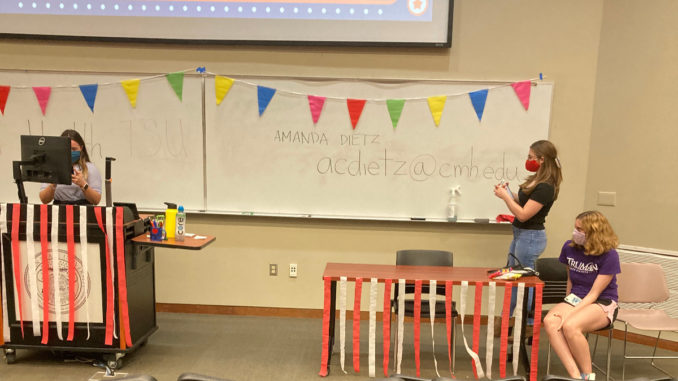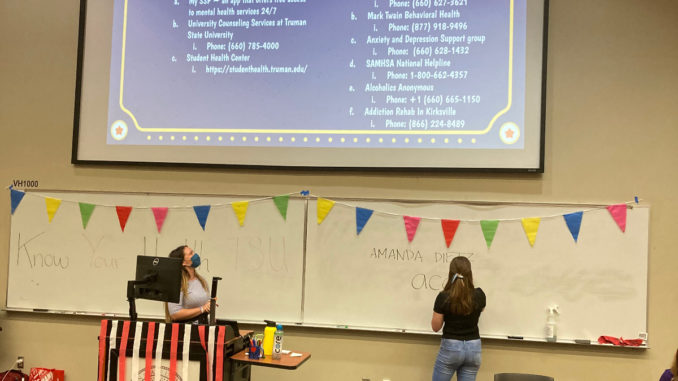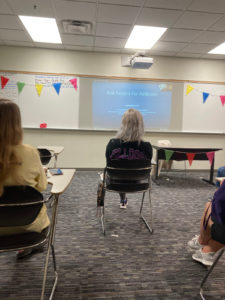
Health science student Madelyn Mahurin was thinking about how her mom had recently been diagnosed with adult-onset asthma when she began to wonder if she was at risk as well.
This thought gave her the idea for her senior capstone project: a Know-Your-Health fair where Truman State University students could learn more about common disorders and their different risk factors. The event took place April 5 and featured three speakers on the topics of eating disorders, addiction and anxiety.
Mahurin worked on the project with her partners, fellow health science students Esobel Moore and Kurt Bryning. Bryning handled the public relations and advertising side of the event. Mahurin applied for funding for the event with the assistance of her partners. Moore assisted with decorating and keeping the event within the guidelines for the class assignment. Mahurin said they worked really well together, and she was grateful to have them as partners.

The speaker for the first topic, eating disorders, was Amanda Dietz, an advanced practice registered nurse and nurse practitioner. Jordan Palmer, a doctor at Complete Family Medicine in Kirksville, gave the second presentation on addiction. Joe Hamilton, assistant director of University Counseling Services, gave the final presentation on anxiety. Dietz gave her presentation virtually, while Palmer and Hamilton’s presentations were pre-recorded.
The speakers outlined their assigned disorder; the different genetic, behavioral and environmental factors that influenced the risk of having the disorder, and different resources to help with the disorder. At the end of the presentations, a survey adapted from screening tools to approximate risk was given to the attendees, and they were given a report of how at-risk they were for the disorder.
Mahurin faced several challenges in trying to find presenters for the fair. Her original plan was to find presenters at UCS, but because it is currently merging with Complete Family Medicine, employees were less accessible.
“Finding the presenters was honestly the most challenging part,” Mahurin said. “I’d say that out of all of the things that were put into this project, if I could just have a little more time on one thing, it would be that.”
She was eventually able to find Palmer and Hamilton through UCS and Dietz through a personal connection. There was originally supposed to be another speaker, but there was confusion surrounding the date of the event. Mahurin said she was happy with the qualifications of the speakers and the presentations were phenomenal.
The other main challenge Mahurin faced was getting the word out about the fair. She attended classrooms, and Bryning made an Instagram account. Mahurin said students don’t like to go to events, but she tried to make it interactive and provide incentives like snacks and a raffle for gift cards.

They also planned to put up posters around campus but had issues with funding. They applied for funding from Missouri Partners in Prevention and the Student Public Health Association, with both initially granting funding. However, with the Complete Family Medicine transition, “Partners in Prevention at Truman State University” ended up allocating less money than originally stated, Mahurin said.
The new chair did not inform them of the funding change until a week and a half before the fair, Mahurin said. Because of this funding cut, they were unable to make the posters they designed.
“I think that recruitment via poster was something that we were really hoping for, and when that didn’t happen, it was kind of a mad scramble,” Mahurin said. “So that’s definitely a lesson, to be implementing multiple channels of recruitment at a time, in case one fails, have a backup plan for each of them.”
In general, Mahurin said she learned a lot about having foresight and anticipating how the event could go wrong. She said she hopes students left the event knowing more about their health.
Junior Ashley Staab found out about the Health Fair from Mahurin, who is her suitemate. She said she understood it was difficult to put on events in person with the pandemic and that it probably affected turnout. She thought it was an important event to have and said it was helpful for her.
“It’s definitely good to learn as much as we can, and I appreciate that they covered some of the big things that they knew would be prevalent in college students and college-aged people,” Staab said. “It definitely covered everything I was expecting, and I think it’s a good event overall to have because college students need more stuff like this.”
Staab said her only constructive criticism was that sometimes it can be overwhelming or scary to learn about mental health issues. While the presentations provided resources for students, Staab said she wished the presentations had focused more on solutions and ways students can improve their health.
Staab said she still appreciated the fair, especially at a time in life when most students are just recently living on their own and still trying to learn about their own health.
“I’m proud of it, honestly,” Mahurin said. “I think that as with life, there were a lot of things that were working against us, but I’m proud of the work that we did and the effort we put into it. I think people came, I think they enjoyed it and I think that we set out what we wanted to do.”
